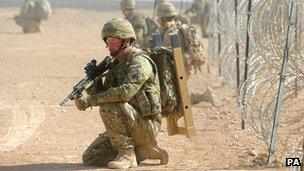Legal claims 'could paralyse' armed forces
- Published

The report calls for legal exemptions for troops
A "sustained legal assault" on British forces could have "catastrophic consequences" for the safety of the nation, an influential right-leaning think tank has warned.
A report for Policy Exchange, external says legal action may paralyse the armed forces.
It also says the cost of litigation against the Ministry of Defence is up, with £130m going towards it in 2012-13.
Lawyers for the families of service personnel have dismissed the findings as "political" and "biased".
Defence Secretary Philip Hammond said he remained "concerned about the challenge to combat immunity arising from recent court judgment".
Entitled The Fog of Law, the report points to the application of the Human Rights Act and the growing application of civilian norms to military conduct via the courts as risks to the UK's armed forces.
It says the MoD has earmarked a total of £130m for litigation - including 5,827 legal cases - in 2012-13; under £70m was spent on legal action in 2008-9.
As part of this, the MoD now employs around 310 lawyers and legal consultants at a cost of £36m a year, the report says.
Combat immunity
Its authors are Territorial Army Lieutenant Colonel and strategy consultant Tom Tugendhat, and retired US Army Lieutenant Colonel Laura Croft, who served in Iraq and also as a lawyer.
They say the main "weapon" used in the legal challenge is the European Convention on Human Rights (ECHR).
Although the ECHR had applied since September 1953, the Human Rights Act (HRA) in 1998 gave individuals the ability to appeal directly to domestic courts.
This, combined with the wars in Afghanistan and Iraq, saw a rise in actions brought through the courts.
In the past, those serving in the military were protected from prosecution under Combat Immunity, while the Law of Armed Conflict regulated the conduct of war.
But recent judicial findings have extended common law claims of negligence and civil claims of duty of care to the combat zone, and the authors claim this is already affecting the combat capability of the services.
'Legal creep'
They cite cases such as that of Ahmed al-Fartoosi, the leader of the radical Shia cleric Moqtada al-Sadr's militia, who is in the process of suing the British government for compensation.
He alleges abuse during his captivity in Basra, and claims that he was denied his rights under the ECHR.
Other claims include that of Ali Al Jedda v the UK (2011). The claimant was arrested travelling from London to Iraq in 2003 on suspicion of being a member of a terrorist group involved in weapons smuggling and explosive attacks in Iraq.
He sued the government under Article 5 of the Human Rights Act, a decision rejected by the UK Supreme Court but overturned by the ECHR.
The Supreme Court ruled this year that British troops remain within the UK's jurisdiction and so fall under the Human Rights Act, even when deployed on active service abroad.
This has led to cases in which relatives of British soldiers have sued the MoD under human rights law.
The report's authors warn that "legal creep" could pose a "mortal threat to the culture and ethos of the military which cannot be easily reversed."
They say that the extension of law risks "catastrophically weakening the UK".
They insist it may not be long before a foreign power or even insurgent forces begin to sponsor legal actions as a way of paralysing UK forces through legal process.
The report adds that claims involving human rights law are increasingly costly, with the MoD estimating that such cases will cost a total of £57m in 2012-13.
The most common cases not involving human rights law brought against the MoD last year related to noise-induced hearing loss and cost £51.3m altogether.
'Reduce risk' obligation
Lt Col Tugendhat told the BBC that military personnel should not be above the law.
But he added: "As the ultimate guarantors of a nation's liberty they have agreed, voluntarily, to surrender or limit many of their own rights. Without this, the nation would be undefended."
The report recommends that:
the government should introduce legislation to define Combat Immunity to allow military personnel to take decisions without having to worry about the risk of prosecution
Parliament should legislate fully to exempt the MoD from the Corporate Manslaughter and Corporate Homicide Act
the UK should derogate from the European Convention on Human Rights during deployed operations
legal aid should be removed from lawsuits brought by foreign nationals against the UK government.
But lawyers for Sue Smith, whose son was killed in a Snatch Land Rover in Iraq in August 2007, criticised Policy Exchange's conclusions.
Jocelyn Cockburn of Hodge Jones & Allen said: "Wives or mothers such as Sue Smith come to me not because they wanted compensation money, but to campaign against the use of Snatch Land Rovers in Iraq because they wanted to protect other soldiers, and improve the safety of servicemen and women abroad.
"It's very important to have independent scrutiny of decisions made by the MoD. War is risky, and therefore you have an obligation to reduce risk and mitigate the threat."

Sue Smith's son Pte Philip Hewett was killed in Iraq
Mr Hammond welcomed the report as a "timely contribution to the debate about the appropriate balance between legal protections and freedom of decision-making by commanders in the field".
But he added: "It cannot be right that troops on operations have to put the European Convention on Human Rights ahead of what is operationally vital to protect our national security."
- Published30 September 2013
- Published31 July 2013
- Published19 June 2013